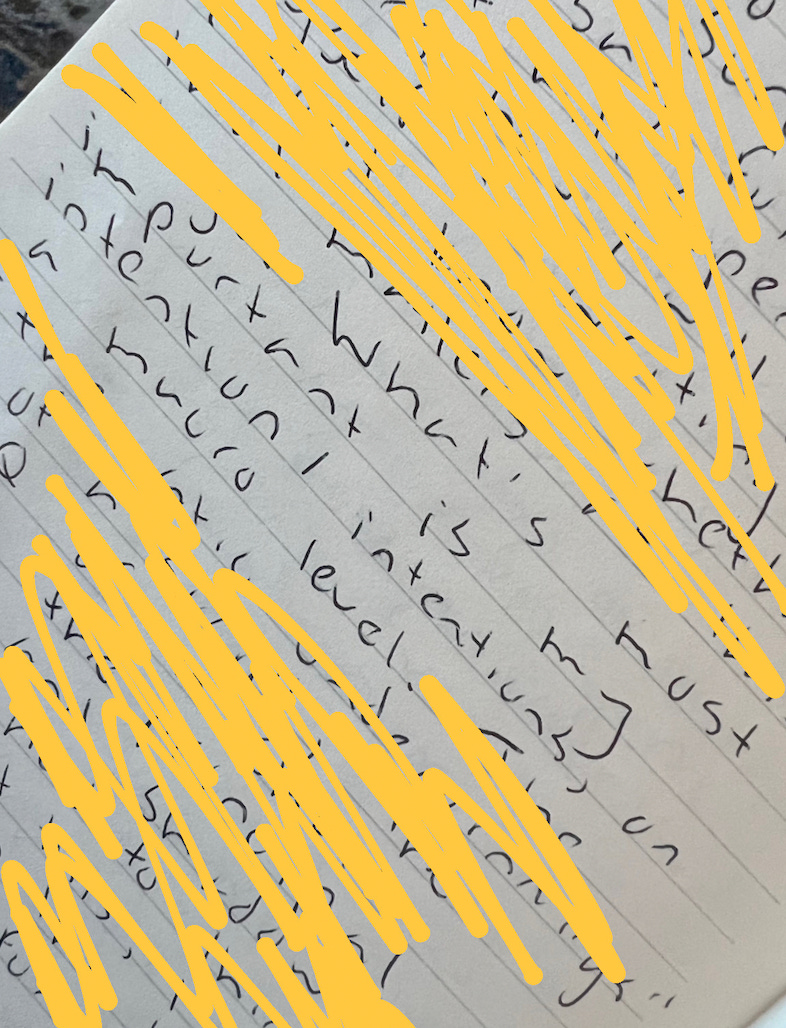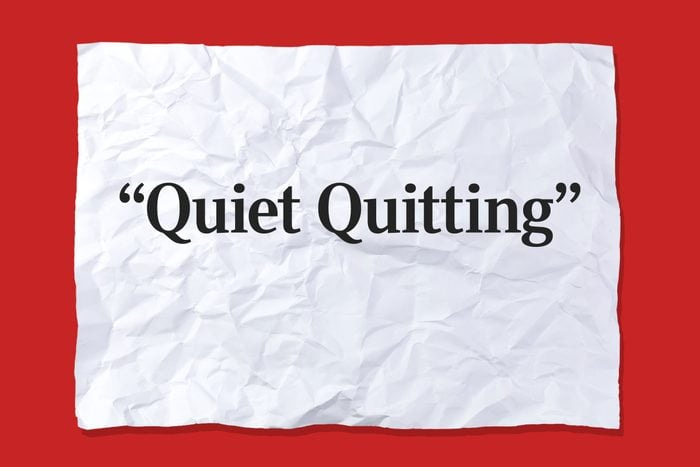Edition #156: Intentions, Intentions
Plus, why don't we dance more, 10 rules for being human, and an elevated cheesy Christmas movie
A Note From the Editor
About a year and a half ago I was hanging out with a new friend who would eventually become a dear friend. It was one of those rare first hangouts where conversation flowed effortlessly, one topic melding seamlessly into the next. I didn’t know it at the time, but this is how it would always go with this particular friend; a rich conversation that only ends because one of us realizes how much time has passed. The sort of conversation that leaves my soul battery charged, my mind pliable and curious.
We covered much ground that evening, but the topic that stuck with me most was the passionate, quasi-argument we had about intentions. In one corner, him, saying that a person’s intentions matter deeply. In the other corner, me, claiming a person’s intentions are worthless. We volleyed fictional scenarios back and forth, mostly centered around love and dating and various interpersonal relationships. My argument was if person A’s actions deeply hurt person B, then it doesn’t matter what person A was intending because person B ended up hurt regardless. He pushed back; maybe person B took person A’s comment out of context. Maybe person B should pause and attempt to understand person A better before reacting. Should person A really be punished if they had only pure, albeit misunderstood intentions?
I’m certain our respective arguments got more nuanced throughout the conversation, though I cannot recall the specifics now. All I know is that I refused to abandon my post. “Intentions are worthless to me,” I repeated like a personal mantra. The next morning, I filled the final page of my journal. Every time I finish a journal and add it to my growing journal stash, I pull an old one from the pile, open it up, and read a few lines at random. As I did so on, my eyes immediately landed on this line, penned in my own chicken scratch:
I texted my new friend a photo right away, laughing hard at myself. I guess my argument wasn’t so rigid after all.
Side A: (Interpersonal) Intentions
As per my own journal, a person’s intentions aren’t as definitively worthless as I had presented them to be, though I can understand why I vehemently backed sentiment. From a broad cultural perspective, we live in a society where impact almost always trumps intent, at least on an interpersonal level. Our internet laden therapy-speak says there are victims and there are perpetrators. If someone says something that hurts my feelings, I am the victim. My truth (of being hurt) trumps their intention (of not meaning to hurt me, say) nearly every time.
I think this happens for two reasons. One, because feelings are a powerful force that take up a lot of space and two, because intentions are slippery things, not as fixed as we might present them to be after the fact. For example, let’s say I’m going on a first date with someone I met on an app. I think they’re cute, our communication has been promising thus far, and I feel ready for a relationship. My intention, going in, is to get to know the person better to see if there might be longer term potential.
But say I get to this date and discover this person doesn’t live anywhere near where I live; they’re just here on vacation and they leave in a few days. Maybe the vibe is flirty and playful. They’re very hot, I realize, and there seems to be chemistry between us. Throughout the course of the date, my intentions begin to shift because of this specific set of circumstances. Maybe I’m no longer assessing this person for their long term potential, but am now open to exploring what this single evening has in store, knowing this may very well be the only time I ever see this person.
It isn’t impossible, or even improbable, for our intentions to shift in real time. And while that’s totally acceptable, it's also part of the reason why the argument, “But that wasn’t my intention,” can come across as futile or dismissive. Our intentions aren’t always clearly fixed goal-posts, they’re more like clouds in the sky. They might start looking like one thing but end up looking like something else. They might move quickly or remain steady in place, soft and billowing. Either way, they are vaporous by nature. We aren’t meant to grasp them and tattoo them onto our skin, but to observe the ways they take shape. To notice them.
Side B: (Setting) Intentions
Then there’s intention setting, that thing the instructor tells you to do at the start of a yoga class. When someone directed me to “set an intention” in the past, my mind would automatically tune out. These days, however, I’ve grown to understand the power of intention setting. Unlike its flashier cousin, goal setting, intention setting isn’t meant to achieve, but simply to cultivate awareness; gently guiding your mind to an anchor point to pull you back into the present.
I start each morning by setting an intention. Nothing fancy, just whatever comes to my mind. For the first few months of doing this, I would forget what intention I’d set for the day in less than 30 minutes. I was consistently amazed by this phenomena—setting, then immediately forgetting day after day. Call it the strength of the monkey mind, but it took consistent practice to begin to remember my intention through the afternoon. Nowadays, I can typically recount my intention even at bed time.
This morning I set the intention to notice what was right in front of me. I was in the ocean surfing for the first time in a few weeks. In between sets, I floated around, my mind blank—then I remembered my intention: to notice what’s in front of you. Nothing in my periphery changed, but I took a closer look. The cool temperature of the water, the brightness of the sun, the clearness of the sky. The group of older men idly chatting with nearby, the way one said, “I’m Norman, by the way,” to another, like a line in a movie. Once I observed all that I felt so lucky to be out there, to be alive. All because I remembered to notice; all because I’d set the intention that morning.
Bringing Intention to Intentions
I used to do this thing where I would give a person I went on too-few dates with a little gift. It didn’t need to be anything elaborate, but I liked to show up with something that proved I was listening. On a first date a few years back, the person mentioned they had just taken the New York State Bar and were anxiously awaiting their results. I found out they passed just before our second or third date, so I got them one of my favorite James Baldwin books and an airplane bottle of whiskey—both things we’d talked about on our first date. They were charmed, I felt good.
I performed these small niceties consistently and without much thought. More recently, I spent a few weeks dating someone who graciously showed me around an area I was unfamiliar with, acting as my personal tour guide. After a scant few hang outs, I felt the strong urge to buy this person a gift. I found an expensive, out-of-circulation board game I knew they’d love on eBay. As I put the game into my cart and began to create an eBay account, I paused. Why was I doing this, really?
I brought it up to my therapist, sharing my history of gift giving in the romantic arena. She asked what my intention was in giving this person a gift. Did I want to do it because I felt like it? No, I admitted, I wanted to do it because of the way it would make me look; like a sweet person worth loving. And if I ordered the game and this person decided they didn’t actually like me, I would feel that much more rejected and resentful because I had been thoughtful. I was acting expecting a reward. In other words, my intentions were not pure.
Herein lies the sweet spot: bringing the deep, slow awareness of intention-setting into our relationships to create space for our true intentions to show up. Oftentimes we aren’t even aware of what our intentions are in our interpersonal relationships—life’s fast past and the dynamic nature of human interaction make it easy to not know what you are doing or why you are doing it. Certain times we are not even acting with intention, but out of instinct. We might be mirroring behavior we learned or adapting to whatever’s happening in our environment. Our intentions may ebb and flow, they may conceal themselves or disappear entirely. To swear they are consistently the driving force of our actions and words, I think, is to let the ego run wild.
But cultivating a daily personal intention practice sets off something like a chain reaction. First, you slow down enough to notice how fast you were going before. You practice setting an intention, holding it in your mind over a period of time, and in doing so, mental space is cleared. In that space, you’re able to step back from your emotional, reactive self and observe. When you begin to observe yourself as more of a bystander than a authoritative director, you begin to notice your patterns; you begin to see more clearly the intention behind your past actions. And from there, you might begin to act with more conscious, true intention in your daily life. You’ve made the space to do so, and so the magic begins.
—--
Cheers, my dears, and as always thank you for reading. I wish you could see the amount of Post-it notes I needed to map out my thoughts on today’s essay. Very A Beautiful Mind, minus the math or general exceptionalism.
I hope you have a wonderful weekend! I’m going to a communal style pop up dinner with a friend tonight and spending the rest of the weekend enjoying the fleeting California sun. Take a cat nap this weekend, eat a good orange, leave a sweet Post-it note for somebody!
Three Pieces of Content Worth Consuming
Why Don’t We Dance More? This headline stopped me in my tracks—before I even clicked, I felt floored. Why don’t we dance more? Growing up, I spent, on average, 20 hours per week dancing. Now, I only dance during weddings or on the rare occasion when I’m out. I’m setting the intention to bring more dancing into my life in 2024!
10 Rules for Being Human. I’d never read this before, though now I’m realizing it is quite widely circulated. It reminded me a bit of the trailer for this lovely movie, which you should see if you haven’t already. Wise and warm.
No, You Shouldn’t ‘Date ’Em ’Til You Hate ’Em’. There is no perfect way to date—and yet, there are some modern dating philosophies that seem particularly counter intuitive. Date ‘em till you hate ‘em is one such philosophy. Faith Hill has steadily become one of my favorite writers this year for the relatable way she covers big, macro love and dating trends. I think you’ll become a fan of hers after reading this one.
Perhaps You Should…Watch a Cheesy Christmas Movie
My sisters and I love watching cheesy Christmas movies together. And as a former Gossip Girl devotee, I squealed when my sister told me there was a new Christmas movie starring none other than Blair Waldorf herself, Leighton Meester. I’d classify this one as elevated cheesy—it’s much more nuanced than your standard Hallmark/Netflix holiday flick with a bit of an indie film flair in the coloring and wardrobe approach, but still perfectly predictable and generally merry. Highly recommend!
**Bonus Content** (2023’s Banished Words List)
This list of words that should be banished in 2023 made me chuckle. You already knew gaslighting was going to make the cut.
Also, I can’t wait to make these unfussy sugar cookies, dying to see this new movie by one of my favorite directors, and some trends to look out for in 2024.
A Quote From A Book You Should Read:
“Terrible how terribly good intentions turn out almost every time.”
-This Other Eden by Paul Harding
This newsletter is best served with a side of conversation, so drop your opinions, reflections, and thoughts in the comments below and let’s get to talking.
Or, share the most thought-provoking piece from today’s edition with someone you love, then call them up to discuss, debate, and percolate. As a wise woman once said, “Great minds discuss ideas.







